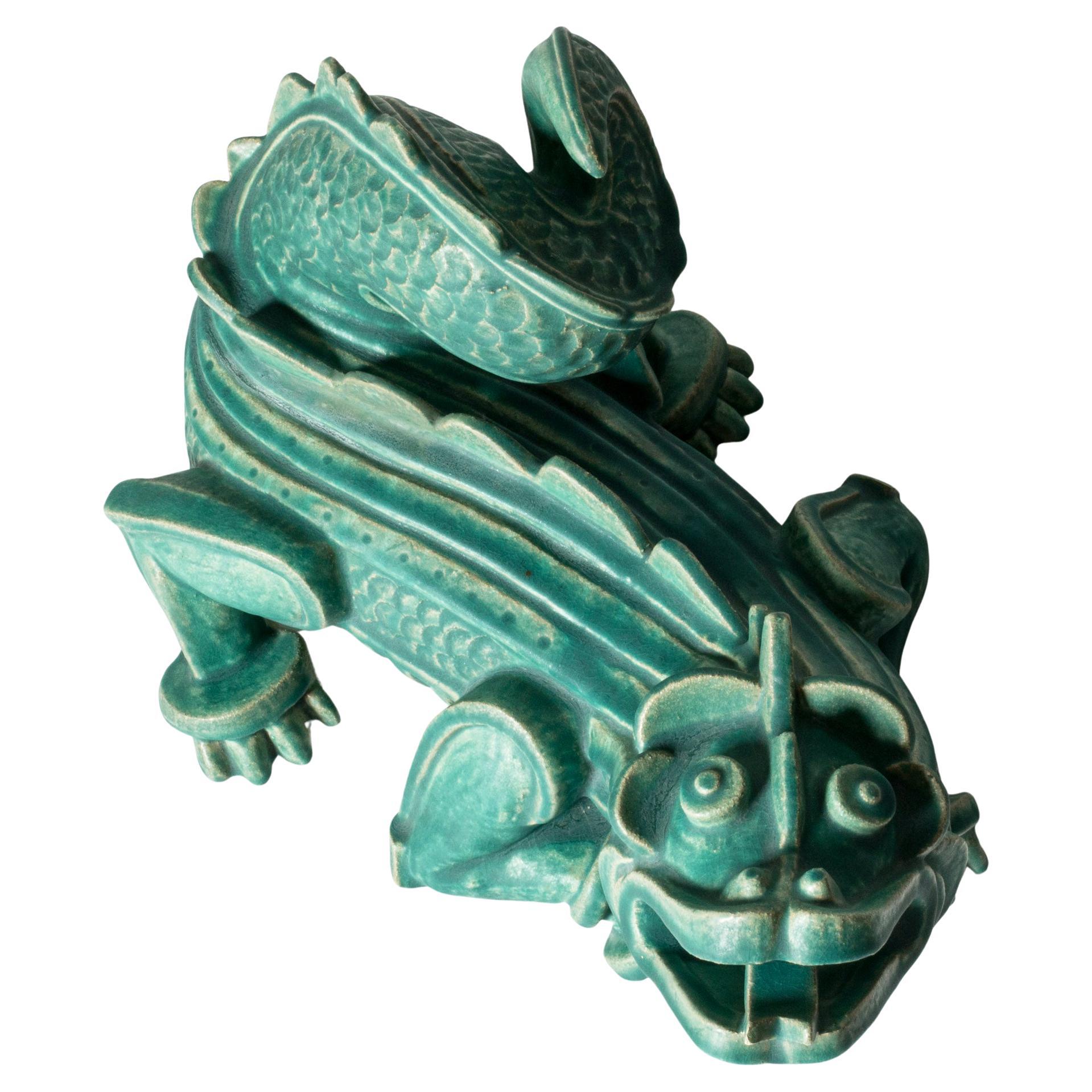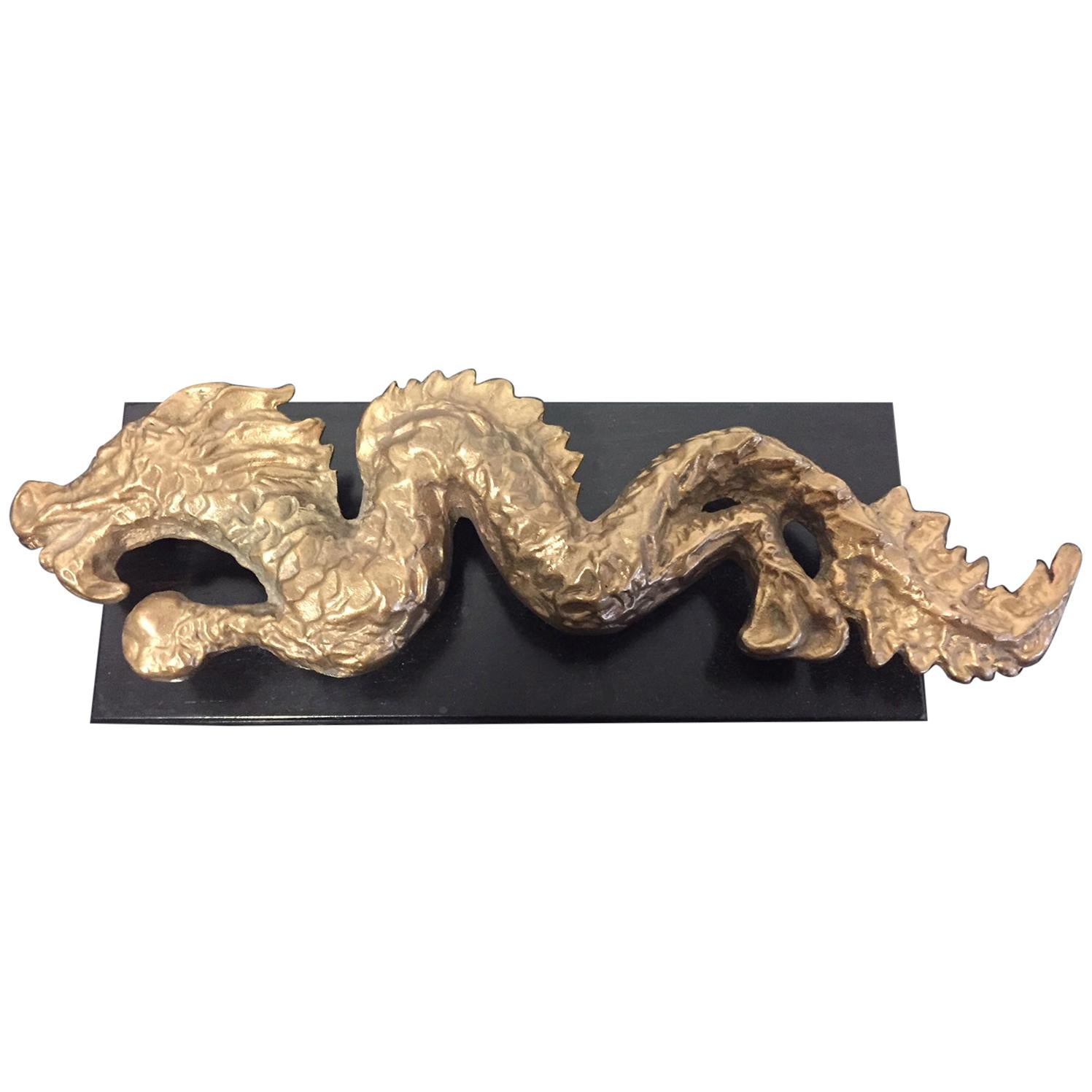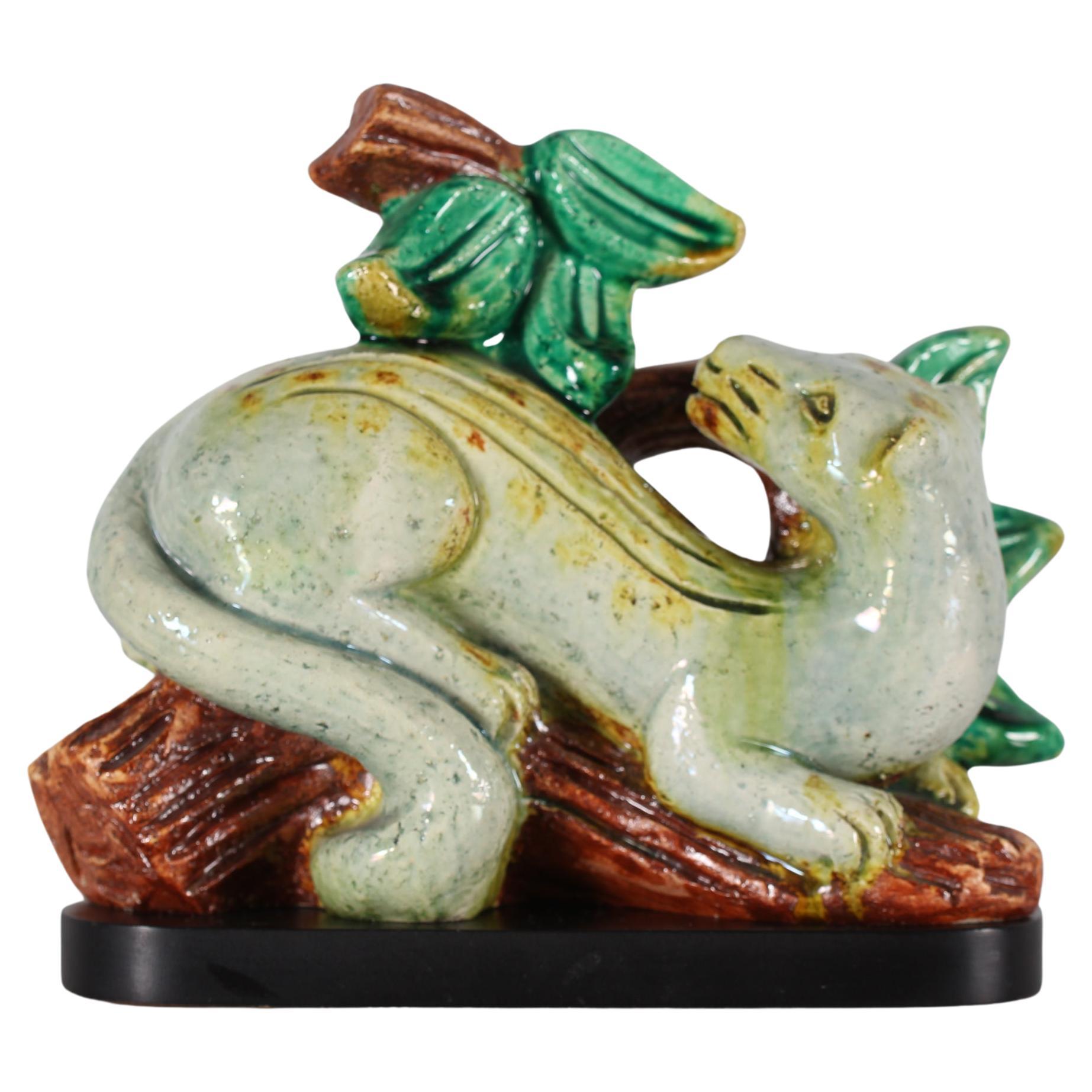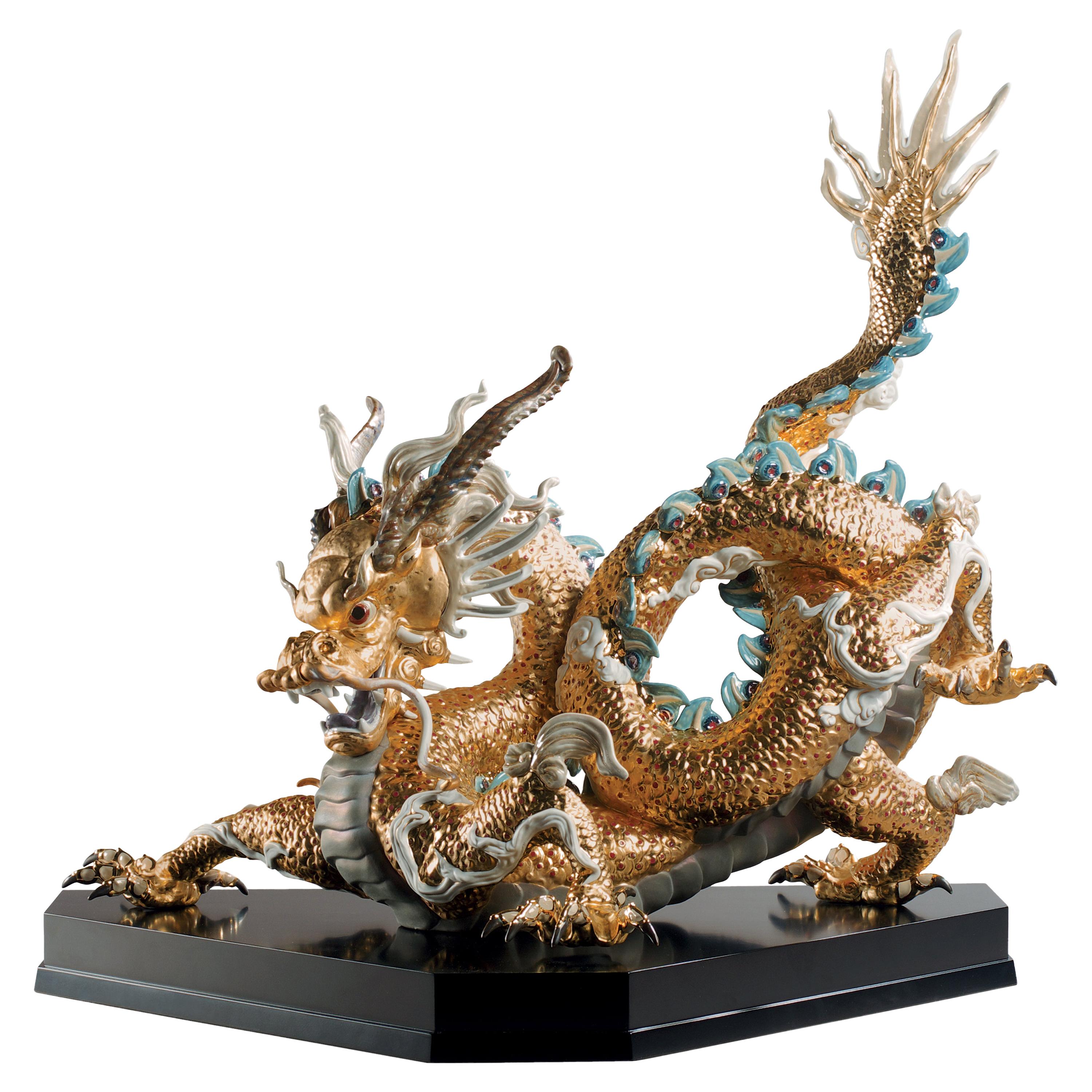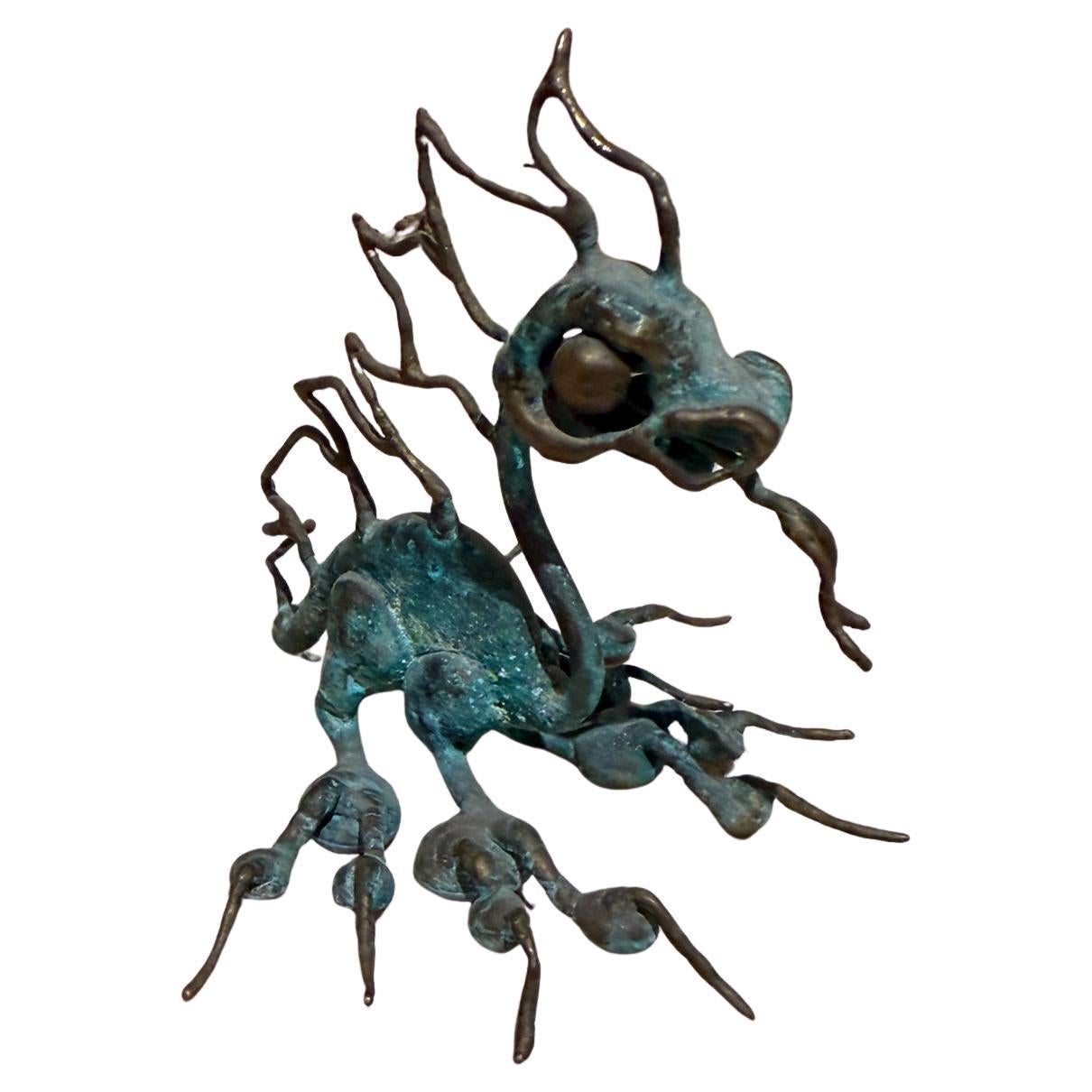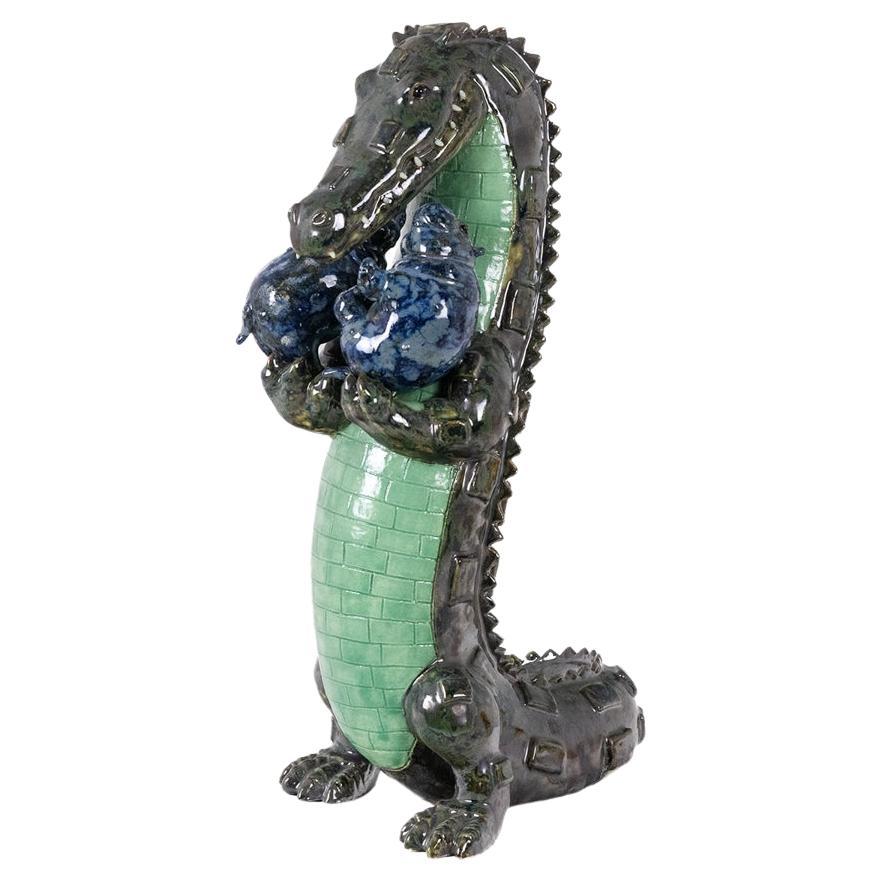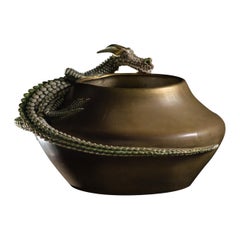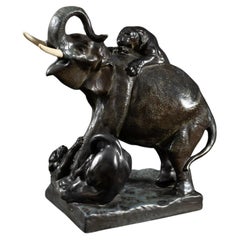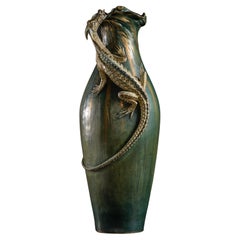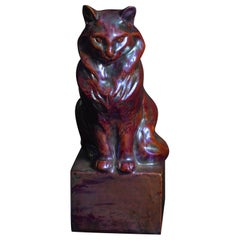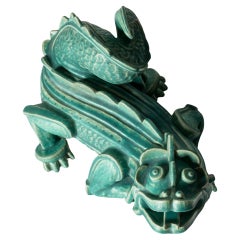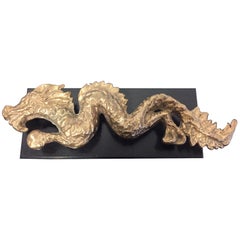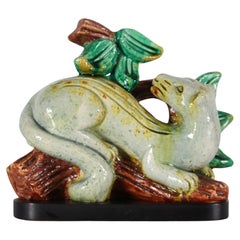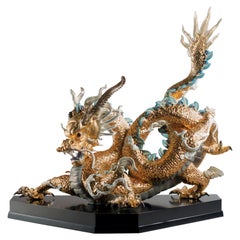Items Similar to Art Deco "Argenta Dragon" sculpture by Wilhelm Kåge
Want more images or videos?
Request additional images or videos from the seller
1 of 12
Art Deco "Argenta Dragon" sculpture by Wilhelm Kåge
$36,900
£28,019.04
€32,041.87
CA$51,554.65
A$57,340.03
CHF 29,941.18
MX$697,767.12
NOK 382,394.55
SEK 358,618.63
DKK 239,140.75
Shipping
Retrieving quote...The 1stDibs Promise:
Authenticity Guarantee,
Money-Back Guarantee,
24-Hour Cancellation
About the Item
Note: We highly recommend shipping through 1stDibs for its cost effectiveness, full insurance coverage, and reliable handling. While standard parcel services are an option, the default quote does not include packing and insurance. 1stDibs shipping provides a level of value, protection, and care that aligns with our commitment to safeguarding historic artworks and providing excellent client service.
ARGENTA DRAGON, by Wilhelm Kåge (Swedish, 1889-1960), aqua green-glazed stoneware with sterling silver accents, mounted on a custom molded wood base, c. 1930, most likely an exhibition piece.
The striking mottled aqua green glaze is an early example of Kåge’s signature wares. The mythical creature is a variation of a Swedish lindorm, a wingless dragon, whose likeness dates back to 11th century runestones and belief in their existence persisted in parts of Sweden well into the 19th century. Kåge applies modernist ceramic design to this Scandinavian folkloric icon to create a seamless new Swedish classic. The sterling silver which wraps the body and its articulations acts much like the heavy black outlines of Japanese wood block prints to achieve a flattening, linear effect which harkens back to Kåge’s early work as a graphic artist. The body is compact and beefy; its power is evident by the contracted limbs and coiled tail at the ready to spring into action. With open mouth revealing a forked serpent’s tongue, the broad-lipped silver banding is smooth and continuous. This contrasts with the silver ingots inlaid in an offset pattern in three rows running down the length of the body suggestive of scales. An important piece of studio art, this is an exceptional example of Kåge’s innovative, yet, timeless appeal.
Wilhelm Kåge (Swedish, 1889-1960) was a ceramicist considered the “Father of Swedish Modernism.” He trained at the University College of Arts, Crafts and Design in Stockholm and studied illustration in Munich. Early in his professional life, Kåge distinguished himself with his poster art. The Gustavsberg Porcelain Factory recognized his untapped potential and hired him in 1917 to become its Artistic Director where he remained until 1949. Over the course of these years, Kåge introduced signature styles of flint pottery and stoneware. His designs evolved to include utilitarian vessels such as crocks and bowls as well as vases and decorative objects with floral, dragons or figural motifs.
1930 marks a watershed moment for Kåge personally as an artist and in terms of The Gustavsberg Porcelain Factory’s success. Kåge burst onto the scene with a 1930 exhibition in Stockholm, introducing his now classic silver with green-glazed ceramic Argenta. He rolled out FARSTA stoneware, one of his best known lines, that same year. Although, the rare red, brown and blue Argenta exists, it is the green and silver Argenta pieces that are universally recognized as Kåge. His work can be found in the Swedish National Museum of Art and Design.
- Creator:Wilhelm Kage (Artist)
- Dimensions:Height: 11.5 in (29.21 cm)Width: 18.5 in (46.99 cm)Depth: 11 in (27.94 cm)
- Style:Art Deco (Of the Period)
- Materials and Techniques:
- Period:
- Date of Manufacture:1930
- Condition:
- Seller Location:Chicago, US
- Reference Number:1stDibs: LU7300238644162
About the Seller
5.0
Vetted Professional Seller
Every seller passes strict standards for authenticity and reliability
1stDibs seller since 2022
17 sales on 1stDibs
Typical response time: 13 hours
- ShippingRetrieving quote...Shipping from: Chicago, US
- Return Policy
Authenticity Guarantee
In the unlikely event there’s an issue with an item’s authenticity, contact us within 1 year for a full refund. DetailsMoney-Back Guarantee
If your item is not as described, is damaged in transit, or does not arrive, contact us within 7 days for a full refund. Details24-Hour Cancellation
You have a 24-hour grace period in which to reconsider your purchase, with no questions asked.Vetted Professional Sellers
Our world-class sellers must adhere to strict standards for service and quality, maintaining the integrity of our listings.Price-Match Guarantee
If you find that a seller listed the same item for a lower price elsewhere, we’ll match it.Trusted Global Delivery
Our best-in-class carrier network provides specialized shipping options worldwide, including custom delivery.More From This Seller
View AllMonumental Amphora Art Nouveau Bowl w/Saurian by Eduard Stellmacher & Co.
By Eduard Stellmacher
Located in Chicago, US
Model #13
Eduard Stellmacher and Co, Porzellanfabrik und Kunstkeramische Industriewerke
Driven to establish a new company that produced luxury porcelain and ceramic items based on his own aesthetic aspirations, Stellmacher left Amphora when the workshop was at its most prosperous, in 1904. Together with entrepreneur Karl Frank, who provided the financial backing, he founded Ed. Stellmacher & Co. in Turn-Teplitz in 1905.
From the outset, Stellmacher worked hard to achieve a major position among other high-end ceramic art producers. He believed the success of the company would depend on his products of “appropriate methods and unerring quality, perfect from both the technical and artistic sides”. Stellmacher based his first collection on artistically progressive products, pieces he believed would be in high demand. The greater part of the designs were either large vases complemented with sculptures of fantastic dragons or natural animals. With this series, Stellmacher continued the themes he had created for Amphora from 1899-1902, however, his naturalistic renderings of animals was even more elaborately precise. He developed a special ceramic material called refined earthenware, which minimized the shrinkage that was common during firing and allowed for greater preservation of details in the original models.
Unfortunately, by 1905, contrary to Stellmacher’s plans, there was little to no demand for objects of this type. Very few pieces exist today as very few were originally produced. Even after redirecting the company to produce commercial goods Stellmacher still could not ward off the company’s demise. By 1910 the Stellmacher & Co. fell into bankruptcy and was liquidated.
Art Nouveau Dragon...
Category
Antique Early 1900s Austrian Art Nouveau Decorative Bowls
Materials
Earthenware
Art Nouveau Sculpture "The Invincable" by Arthur Strasser for RStK Amphora
By Reissner Stellmacher & Kessel, Arthur Strasser
Located in Chicago, US
Model #8190.
Note: We highly recommend shipping through 1stDibs for its cost effectiveness, full insurance coverage, and reliable handling. While standard parcel services are an opt...
Category
Antique Early 1900s Austrian Art Nouveau Animal Sculptures
Materials
Earthenware
Monumental Amphora Art Nouveau Vase w/Saurian by Eduard Stellmacher & Co.
By Eduard Stellmacher
Located in Chicago, US
Model #2
Eduard Stellmacher and Co, Porzellanfabrik und Kunstkeramische Industriewerke
Driven to establish a new company that produced luxury porcelain and ceramic items based on his own aesthetic aspirations, Stellmacher left Amphora when the workshop was at its most prosperous, in 1904. Together with entrepreneur Karl Frank, who provided the financial backing, he founded Ed. Stellmacher & Co. in Turn-Teplitz in 1905.
From the outset, Stellmacher worked hard to achieve a major position among other high-end ceramic art producers. He believed the success of the company would depend on his products of “appropriate methods and unerring quality, perfect from both the technical and artistic sides”. Stellmacher based his first collection on artistically progressive products, pieces he believed would be in high demand. The greater part of the designs were either large vases complemented with sculptures of fantastic dragons or natural animals. With this series, Stellmacher continued the themes he had created for Amphora from 1899-1902, however, his naturalistic renderings of animals was even more elaborately precise. He developed a special ceramic material called refined earthenware, which minimized the shrinkage that was common during firing and allowed for greater preservation of details in the original models.
Unfortunately, by 1905, contrary to Stellmacher’s plans, there was little to no demand for objects of this type. Very few pieces exist today as very few were originally produced. Even after redirecting the company to produce commercial goods Stellmacher still could not ward off the company’s demise. By 1910 the Stellmacher & Co. fell into bankruptcy and was liquidated.
Art Nouveau Dragon...
Category
Antique Early 1900s Austrian Art Nouveau Decorative Bowls
Materials
Earthenware
Symbolist Cat
By Zsolnay
Located in Chicago, US
"It is easy to understand why the rabble dislike cats. A cat is beautiful; it suggests ideas of luxury, cleanliness, and voluptuous pleasures." - Charles Baudelaire
Iridescence, which changes in every angle of reflected light, is the perfect complement to a cat’s capricious nature. Zsolnay introduced its patented shiny metallic glaze, known as eosin, in 1893. The small family ceramics workshop begun in Pecs, Hungary by Miklos Zsolnay in 1853 had evolved into a world-class ceramics factory by this time. Zsolnay walked away with the Grand Prix at the 1878 World’s Fair in Paris for its art pottery. Under the stewardship of Vilmos Zsolnay...
Category
Antique Early 1900s Hungarian Art Nouveau Animal Sculptures
Materials
Earthenware, Porcelain
$7,000
"Coatl with Bird" Sculpture by Rosemarie Benedikt
By Rosemarie Benedikt
Located in Chicago, US
Note: We highly recommend shipping through 1stDibs for its cost effectiveness, full insurance coverage, and reliable handling. While standard parcel services are an option, the defau...
Category
Vintage 1970s Austrian Mid-Century Modern Animal Sculptures
Materials
Porcelain, Paint
Lizard Vase by Eduard Stellmacher for RStK Amphora
By Amphora, Eduard Stellmacher
Located in Chicago, US
Note: We highly recommend shipping through 1stDibs for its cost effectiveness, full insurance coverage, and reliable handling. While standard parcel services are an option, the defau...
Category
Antique Early 1900s Austrian Art Nouveau Vases
Materials
Earthenware
You May Also Like
Stoneware dragon sculpture by Wilhelm Kåge, Gustavsberg, Sweden, 1940s
By Gustavsberg, Wilhelm Kage
Located in Stockholm, SE
Stunning, unique dragon sculpture by Wilhelm Kåge, made from stoneware with beautiful green glaze. Rare, large size. Very expressive and lively design, inspired by Chinese Ming era d...
Category
Vintage 1940s Swedish Scandinavian Modern Animal Sculptures
Materials
Stoneware
Bronze Dragon Sculpture Wax Cast and Fire Gilding by Tillmann Köhn
Located in Hamburg, DE
Bronze dragon sculpture wax cast and fire gilding by Tillmann Köhn
Can be used as display, well as door or handle handle
the dragon is 22cm long x 7cm ...
Category
Early 2000s German Organic Modern Animal Sculptures
Materials
Bronze
Gunnar Nylund Animal Sculpture of Weasel in Nature for Rörstrand Sweden, 1960s
By Rörstrand, Gunnar Nylund
Located in Silkeborg, Silkeborg
Vintage animal sculpture/figurine of a weasel in nature by Gunnar Nylund for Rörstrand, Sweden. Made ca 1960s.
The sculpture is made of st...
Category
Mid-20th Century Swedish Mid-Century Modern Animal Sculptures
Materials
Stoneware
Lladró Great Dragon Sculpture by Francisco Polope. Limited Edition.
By Lladro, Francisco Polope
Located in New York City, NY
Limited edition dragon sculpture in matte porcelain with gold lustre. A symbol of power and prosperity in Eastern culture, this magical creature, the bearer of good luck, is the protagonist in this spectacular High Porcelain limited edition. The hundreds of scales covering its skin are individually hand painted with gold lustre, an extremely laborious technique requiring the expertise of the finest artists. The luminosity distinguishing its spectacular embellishment is attained by combining gloss and satin finishes, united by an iridescent metallic hue on the chest and a vivid turquoise hue on the crest. The complexity of the dragon´s...
Category
21st Century and Contemporary Spanish Modern Animal Sculptures
Materials
Porcelain
Patinated Sculpture Art Bronze Dragon
Located in Chula Vista, CA
Patinated Sculpture Art Bronze Dragon
green patina
unmarked
in the style of Han Vo California
3.13 h x 3.13 w x 3.5 d
Preowned vintage condition
Refer to images listed
Category
Late 20th Century Modern Animal Sculptures
Materials
Bronze
Valerie Courtet. Crocodile carrying hippos. Contemporary.
Located in Saint-Ouen, FR
Valérie Courtet.
Sculpture in chamotte stoneware representing a crocodile carrying hippos.
Work of a contemporary French artist.
Dimensions: H 56 x W 30 x D 22 cm
Reference: LS64...
Category
20th Century French Animal Sculptures
Materials
Stoneware
More Ways To Browse
Dragon Handle
Art Deco Dragon
Japanese Wood Block
Art Deco Wood Figure
Serpent Object
Ceramic Dragons
1930 Compact
Serpent Sculpture
Green Dragon Vase
Black Dragon Vase
Blue Dragon Porcelain Vases
Dragon Pottery
Dragon Vase Ceramic
Wilhelm Kage Argenta Gustavsberg
Wilhelm Kage Argenta
Art Deco Japanese Vase
Serpent Vase
Japanese Compact
